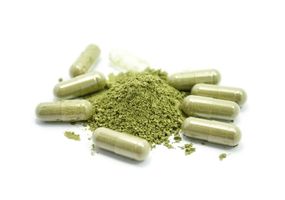Kratom & 7-OH Understand the Differences
Kratom and 7-OH often have been coming up in wellness conversations and sometimes they are discussed as if they're interchangeable, but it’s essential to understand the distinction between the two before incorporating them into your routine. At MitraSpec, we aim to provide clear, accurate information about these compounds, helping you make informed decisions with confidence.

Getting to know Kratom
Kratom is both a plant and a preparation made of the plant’s leaves. In botanical terms, it always refers to the Mitragyna speciosa tree. It naturally grows in the wetland forests of Indonesia, Malaysia, Thailand, and other Southeast Asian countries.
When you come across Kratom for sale, it’s usually the dried leaves of this tree, available in several common forms:
PowderCrushed leaves (often for tea)Capsules filled with the powderGummies
Kratom leaves are jam-packed with natural compounds, including alkaloids. The two of them you’ll hear of most frequently are mitragynine and 7-Hydroxymitragynine (often referred to and marketed as 7-OH).
Think of Kratom leaves as a whole team of alkaloids. The exact mix may include more or fewer compounds at higher or lower concentrations based on where the tree grows, its age, and how the leaves are harvested and dried.

What is 7-OH Kratom vs Kratom?
Now, let’s have a closer look at Kratom vs 7-OH in the context of this specific alkaloid. You can find 7-OH in miniscule amounts within the leaf in combination with other alkaloids. When you see products displaying “7-OH,” it usually means that this substance has been isolated and concentrated, or, sometimes, even made in a lab and added to Kratom powder or sold on its own. This is quite different from using the whole Mitragyna speciosa leaf, which has a broader mix of natural compounds.
The core difference between Kratom and 7-OH comes down to what you get:
By opting for Kratom, you get the whole leaf of the Mitragyna speciosa tree or products made directly from it (like powders). It gives you the full spectrum of alkaloids as they exist in nature, with mitragynine being the most plentiful, and 7-OH present in naturally low amounts. It’s the plant in its more complete, traditional form.
By going for 7-OH, you get your hands on 7-Hydroxymitragynine that’s been pulled out and concentrated, or possibly made synthetically, to make up a much larger part of the substance than you’d ever find in a raw leaf.
While 7-OH may be derived from Kratom, it’s a whole different animal when compared to Kratom’s effects.7-OH is considered to be more powerful, offering enhanced potency and a stronger analgesic effect, making it potentially addictive. This highlights the importance of responsible usage and moderation when it comes to consuming Kratom or any substance.
Moreover, while Kratom has been used for centuries in traditional medicine practices, the use of 7-OH as a concentrated form is very new and lacks long-term studies on its effects. It’s essential to understand the potential risks and drawbacks associated with consuming this derivative before making a decision to use it.
Additionally, the process of extracting and concentrating 7-OH from Kratom involves using chemicals that may alter its natural state and composition. This could potentially lead to unforeseen side effects or interactions with other medications.
Furthermore, the lack of regulation and standardization in the production and distribution of 7-OH supplements can also be a cause for concern. Without strict guidelines and quality control measures in place, there is no guarantee of consistency or purity in the products being sold.
It's important to note that while some individuals may experience positive effects from consuming 7-OH, others may not see any noticeable benefits at all. Each person's body chemistry and response to different substances can vary greatly, so it's always best to consult with a healthcare professional before starting any new supplement regimen.
Moreover, relying solely on 7-OH as a solution for pain management or other health issues can be risky. It's important to incorporate other healthy habits such as regular exercise, a balanced diet, and stress management techniques in order to maintain overall well-being.
Additionally, there is limited research on the long-term effects of 7-OH supplementation. As with any supplement or medication, it's crucial to carefully monitor for any adverse reactions or interactions with other medications.
In conclusion, at MitraSpec, we are committed to prioritizing your well-being by promoting pure, responsibly sourced kratom. We strongly discourage the use of highly processed products like "enhanced kratom" and kratom extracts and especially 7-OH products, as they can pose health risks and diminish the natural benefits of this remarkable plant. By choosing natural, unadulterated kratom, we can ensure its potential benefits remain safe, effective, and sustainable for the long term.
